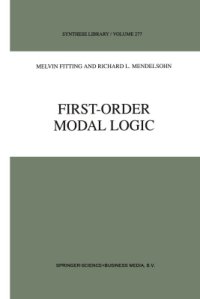
Ebook: First-Order Modal Logic
- Genre: Mathematics // Logic
- Tags: Математика, Математическая логика
- Series: Synthese Library 277
- Year: 1988
- Publisher: Springer
- Language: English
- pdf
New York: Springer. 1998/ 300 p. ISBN 978-0-7923-5335-5; ISBN 978-94-011-5292-1 (eBook)This is a thorough treatment of first-order modal logic. The book covers such issues as quantification, equality (including a treatment of Frege's morning star/evening star puzzle), the notion of existence, non-rigid constants and function symbols, predicate abstraction, the distinction between nonexistence and nondesignation, and definite descriptions, borrowing from both Fregean and Russellian paradigms.Table of contentsPrefacePropositional Modal LogicWhat is a Modal?
Can There Be a Modal Logic?
What Are The Formulas?
Aristotle's Modal Square
Informal Inlcrprc tat ions
What Are the Models?
Examples
Some Important logics
Logical Consequence
Temporal Logic
Epistcmic Logic
Historical HighlightsTableau Proof SystemsWhat Is a Proof
Tableaus
More Tableau Systems
Logical Consequence and Tableau*
Tableaus WorkAxiom SystemsWhat Is an Axiomatic Proof
More Axiom Systems
Logical Consequence. Axiomatically
Axiom Systems Work TooQuantified Modal LogicFirst-Order Formulas
An Informal Introduction
Necessity De Re and Dc Dicto
Is Quantified Modal l-ogic Possible?
What the Quantifiers Quantify Over
Constant Domain Models
Varying Domain Models
Different Media, Same Message
Barcan and Converse Bare an FormulasFirst-order tableausConstant Domain Tableaus
Varying Domain Tableaus
Tableaus Still WorkFirst-Order Axiom SystemsA Classical First-Order Axiom System
Varying Domain Modal Axiom Systems
Constant Domain Systems
MiscellanyEqualityClassical Background
Frege's Puzzle
The Indiscernibility of Identicals
The Formal Details
Tableau Equality Rules
Tableau Soundness and Completeness
An ExampleExistence and actualist quantificationTo Be
Tableau Proofs
The Paradox of NonBcing
Deflationists
Parmenides' Principle
Inflationists
Unactualized Possibles
Barcan and Converse Barcan, Again
Using Validities in Tableaus
On SymmetryTerms and Predicate AbstractionWhy constants should not be constant
Scope
Predicate Abstraction
Abstraction in the Concrete
Reading Predicate AbstractsAbstraction continuedEquality
Rigidity
A Dynamic Logic Example
Rigid Designators
Existence
Tableau Rules, Varying Domain
Tableau Rules, Constant DomainDesignationThe Formal Machinery
Designation and Existence
Existence and Designation
Fiction
Tableau RulesDefinite DescriptionsNotation
Two Theories of Descriptions
The Semantics of Definite Descriptions
Some Examples
Hintikka's Schema and Variations
Varying Domain Tableaus
Russell's Approach
Possibilist QuantifiersReferences
Index
Can There Be a Modal Logic?
What Are The Formulas?
Aristotle's Modal Square
Informal Inlcrprc tat ions
What Are the Models?
Examples
Some Important logics
Logical Consequence
Temporal Logic
Epistcmic Logic
Historical HighlightsTableau Proof SystemsWhat Is a Proof
Tableaus
More Tableau Systems
Logical Consequence and Tableau*
Tableaus WorkAxiom SystemsWhat Is an Axiomatic Proof
More Axiom Systems
Logical Consequence. Axiomatically
Axiom Systems Work TooQuantified Modal LogicFirst-Order Formulas
An Informal Introduction
Necessity De Re and Dc Dicto
Is Quantified Modal l-ogic Possible?
What the Quantifiers Quantify Over
Constant Domain Models
Varying Domain Models
Different Media, Same Message
Barcan and Converse Bare an FormulasFirst-order tableausConstant Domain Tableaus
Varying Domain Tableaus
Tableaus Still WorkFirst-Order Axiom SystemsA Classical First-Order Axiom System
Varying Domain Modal Axiom Systems
Constant Domain Systems
MiscellanyEqualityClassical Background
Frege's Puzzle
The Indiscernibility of Identicals
The Formal Details
Tableau Equality Rules
Tableau Soundness and Completeness
An ExampleExistence and actualist quantificationTo Be
Tableau Proofs
The Paradox of NonBcing
Deflationists
Parmenides' Principle
Inflationists
Unactualized Possibles
Barcan and Converse Barcan, Again
Using Validities in Tableaus
On SymmetryTerms and Predicate AbstractionWhy constants should not be constant
Scope
Predicate Abstraction
Abstraction in the Concrete
Reading Predicate AbstractsAbstraction continuedEquality
Rigidity
A Dynamic Logic Example
Rigid Designators
Existence
Tableau Rules, Varying Domain
Tableau Rules, Constant DomainDesignationThe Formal Machinery
Designation and Existence
Existence and Designation
Fiction
Tableau RulesDefinite DescriptionsNotation
Two Theories of Descriptions
The Semantics of Definite Descriptions
Some Examples
Hintikka's Schema and Variations
Varying Domain Tableaus
Russell's Approach
Possibilist QuantifiersReferences
Index
Download the book First-Order Modal Logic for free or read online
Continue reading on any device:

Last viewed books
Related books
{related-news}
Comments (0)